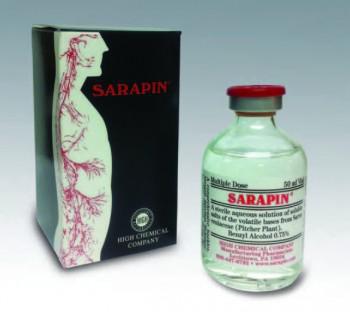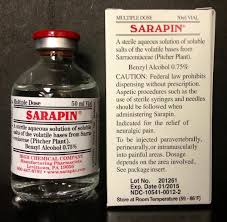Sarapin injection comes in when it comes to managing pain in horses, finding a safe and effective treatment option is essential for their long-term health and well-being. One of the most reliable options available is injectable Sarapin, a natural remedy that has been used for decades to treat various types of pain, particularly in equine care. This blog post will explore everything you need to know about injectable Sarapin for horses — from its benefits, how it works, the conditions it treats, to its potential side effects and why it could be the right choice for your horse.
What is Injectable Sarapin?
Sarapin is a plant-based injectable pain relief medication derived from the pitcher plant (Sarracenia purpurea). It has been used for more than 70 years in both human and veterinary medicine, particularly for pain management without the use of narcotics or corticosteroids. Sarapin is a non-toxic and non-addictive solution that works by targeting nerve tissue, providing pain relief without disrupting normal sensation or causing the undesirable side effects associated with other pain medications.
How Does Sarapin Work for Horses?
Injectable Sarapin is a powerful natural analgesic that works by blocking pain signals at the nerve root level. Unlike traditional medications like NSAIDs or opioids that target the inflammation and pain directly, Sarapin focuses on preventing the transmission of pain impulses through the nervous system. This makes it particularly effective in cases of chronic pain that stem from nerve-related issues, such as arthritis or back pain in horses.
Sarapin is often injected into the areas surrounding irritated nerves, typically near the spine or joints. By targeting specific pain pathways, it can help alleviate discomfort without the risks associated with long-term steroid use or dependency on more aggressive pain medications.
Benefits of Using Injectable Sarapin for Horses

There are several notable benefits of using injectable Sarapin for horses, including:
- Non-Toxic and Safe: One of the key advantages of Sarapin is that it is derived from natural plant sources and has no known toxic effects. This makes it a much safer option compared to synthetic painkillers and steroid injections.
- No Side Effects on Organs: Unlike NSAIDs, which can affect the liver, kidneys, and gastrointestinal system, Sarapin does not have any negative impact on a horse’s organs. This makes it ideal for long-term pain management.
- Non-Addictive: Horses treated with Sarapin do not develop a dependency on the medication, which can be a concern with some opioid-based treatments.
- Targeted Pain Relief: By targeting nerve pain directly, Sarapin offers localized relief, which is particularly useful for conditions such as arthritis, back pain, or injuries where nerve inflammation is a major source of discomfort.
- Improved Mobility: Horses that suffer from chronic pain often experience decreased mobility. By reducing pain effectively, Sarapin can improve your horse’s quality of life and overall activity levels.
- Long-Lasting Relief: Many horses experience long-lasting pain relief from Sarapin injections, with the effects typically lasting several weeks, reducing the need for frequent treatments.
Conditions Treated with Injectable Sarapin for Horses
Sarapin can be used to manage a wide variety of pain-related conditions in horses, particularly those related to nerve inflammation or musculoskeletal issues. Some of the most common conditions include:
- Arthritis: As horses age, they may experience joint pain and inflammation. Sarapin helps to alleviate the pain caused by arthritis by targeting the affected nerves, offering long-lasting relief without the risks associated with NSAIDs or steroids.
- Back Pain: Back pain in horses, particularly those involved in strenuous activities like racing or showjumping, can be debilitating. Sarapin injections help to relieve nerve pain along the spine, improving mobility and performance.
- Laminitis: Horses suffering from laminitis can experience extreme pain in their hooves. Sarapin offers relief by addressing the nerve pain associated with this condition.
- Neck and Shoulder Pain: Injuries or nerve impingement in the neck and shoulders can cause significant discomfort. Sarapin’s ability to target and relieve nerve pain makes it an ideal option for these cases.
- Post-Surgical Pain: Horses recovering from surgery can benefit from Sarapin as part of their post-operative care plan to manage pain effectively and promote faster healing.
How Injectable Sarapin is Administered
Injectable Sarapin is typically administered by a veterinarian through a precise injection into the area where pain is localized. Depending on the severity of the condition, multiple injections may be required to achieve optimal results. The dosage and frequency of injections will be determined based on your horse’s specific needs and the underlying condition being treated.
Sarapin can be used on its own or in combination with other treatments such as physical therapy, chiropractic care, or other medications. It’s important to consult with your veterinarian to develop a customized pain management plan tailored to your horse’s needs.
Potential Side Effects of Sarapin in Horses
One of the most appealing aspects of Sarapin is its minimal risk of side effects, especially compared to traditional pain relief options. However, like any medication, it’s important to monitor your horse for any potential adverse reactions.
Common side effects may include:
- Mild swelling or discomfort at the injection site: This typically resolves on its own within a few hours to days.
- Allergic reactions: While rare, some horses may have an allergic response to the plant-based solution.
If your horse shows any unusual signs after receiving a Sarapin injection, such as excessive swelling, hives, or difficulty breathing, contact your veterinarian immediately.
Why Choose Injectable Sarapin for Your Horse?
If your horse is struggling with chronic pain, inflammation, or nerve-related conditions, injectable Sarapin could be a game-changer in managing their discomfort. Its natural composition, safety profile, and effectiveness in targeting nerve pain make it an excellent option for long-term pain management. Whether your horse is an aging companion or a competitive athlete, Sarapin can help improve their quality of life by reducing pain and improving mobility.
Additionally, using Sarapin may reduce the need for other medications, helping you avoid the side effects associated with long-term use of NSAIDs or opioids. This makes it a great choice for owners looking for a more holistic approach to pain management.
Frequently Asked Questions About Injectable Sarapin for Horses

Q: How often does my horse need Sarapin injections?
A: The frequency of Sarapin injections depends on your horse’s condition and response to the treatment. In some cases, horses may experience long-lasting relief from a single injection, while others may require periodic injections.
Q: Can Sarapin be used alongside other pain medications?
A: Yes, Sarapin can be used in conjunction with other pain management therapies. However, it’s important to discuss your horse’s overall treatment plan with your veterinarian to ensure there are no contraindications.
Q: How quickly does Sarapin work?
A: Most horses experience pain relief within a few days of receiving an injection. In some cases, the relief may be immediate, while in others, it may take a few days for the full effects to become apparent.
Conclusion
Choosing the right pain management solution for your horse is crucial in ensuring their long-term health and well-being. Injectable Sarapin offers a natural, safe, and effective option for treating nerve-related pain in horses, without the risks associated with more traditional medications. Whether your horse is dealing with arthritis, back pain, or other chronic conditions, Sarapin can provide the relief they need to live a more comfortable and active life.
To learn more or purchase Sarapin 50ml injection online, visit our website.
Read More On Horse And Camel Medication
Vitamin B12 (Cobalamin ) For Horses
Improving Circulation in Your Horse
Healing Horse Wounds With Apple Cider Vinegar


